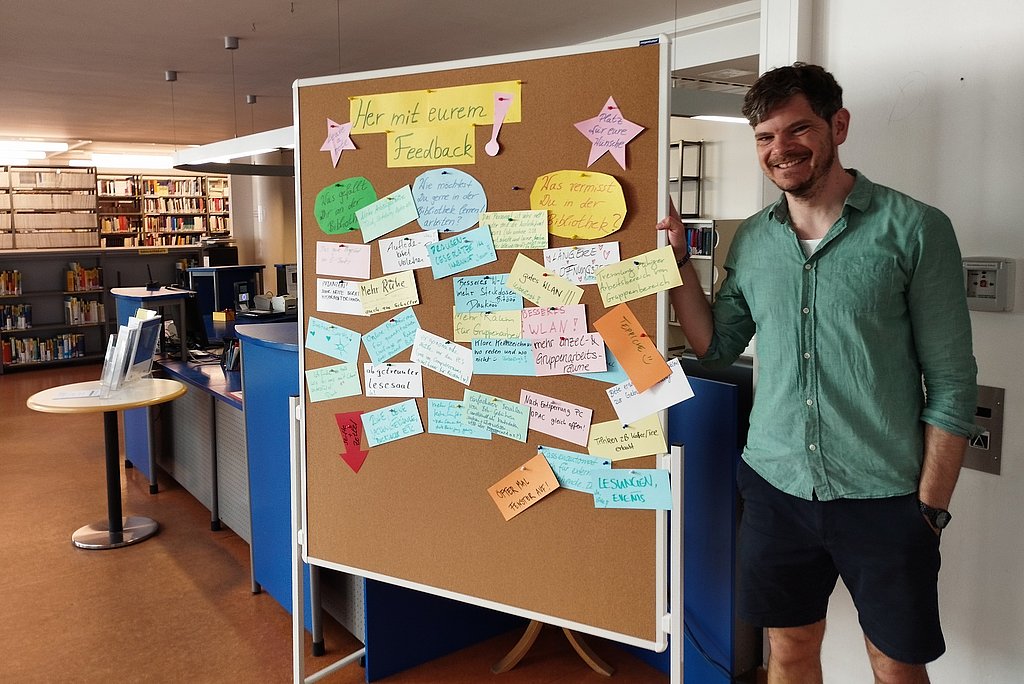Libraries are undoubtedly very special places. They represent an intermediate space where people come together for very different reasons: To read, study, work or relax. In specialist literature, the library is often referred to as a "third place", which represents an alternative to one's own home on the one hand and the office or seminar room on the other.
However, libraries are less and less in keeping with the traditional image of a cathedral-like storehouse of knowledge that seems to be removed from world events. The increasing dominance of electronic media in the form of e-books and e-journals led to a gradual loss of importance of printed works years ago. Sooner or later, book shelves will no longer be the sole space-defining element in libraries. But what will take their place?
The current situation
Fortunately, we don't have to complain about a lack of public traffic at ASH Berlin. After the coronavirus crisis, the library's visitor numbers have stabilized again at a pleasingly high level. The workstations on the ground floor and mezzanine are popular with everyone who is writing their term papers or theses here. The lounge is a great place to while away the breaks between seminars.
However, a look at the comments on the pinboard in the library foyer from December to March shows that there is still room for improvement. We wanted to know: What do you particularly like? What do you miss? How would you like to learn and work in this place? The questions were deliberately open-ended in order to capture as many opinions as possible. The feedback wall was supplemented by a pad that could be used to express praise or criticism online.
Unsurprisingly, but no less important, the desire for more stable, nationwide Wi-Fi came in at number 1 by some distance.
Other requests included longer opening hours, more space for group work, quiet zones for concentrated individual work and a clearer distinction between quiet and lively areas. Users were particularly satisfied with the extensive range of e-books, the friendly staff and the idyllic planting. Many thanks for the flowers!
Of course, this form of survey is not representative. Nevertheless, it clearly shows the desire for spaces for informal learning and working, which is currently not sufficiently catered for at ASH - not even in the library. This finding is in line with study results from university research. Self-directed learning takes place especially in the off-peak times before, between and after face-to-face seminars. Students meet spontaneously to form study groups or combine their lunch break with preparation for a presentation. University libraries are by far the most attractive learning space for students across all institutions (Vogel 2020, 156f.)[i].
The plan
The library will take these ideas on board and incorporate them into a long-term redesign process. To this end, a roadmap has been formulated that provides for the intensive involvement of various user groups at defined points in the planning process. The library team will now first identify a specific redesign measure as a pilot project and outline various design options. What should the furniture look like? What technical infrastructure will support working with personal devices on site? Should this area of the library be communicative or should the focus be on concentrated, quiet individual work? To answer these questions, the library will engage in intensive discussions with the facility management team.
Students, teaching staff, researchers and other stakeholders are then invited to vote for their preferred option and add their own ideas. The library is currently developing suitable participation formats and will then issue a university-wide call for participation.
We are very much looking forward to the dialog with you!
PS: If you can't wait, please share your ideas and wishes with us now at the following address: bibliothek@ ash-berlin.eu
[i] Vogel, B. (2020): The self-study of students. In: Stang, R., Becker, A. (eds.): Zukunft Lernwelt Hochschule. Perspectives and options for a reorientation. De Gruyter. https://doi.org/10.1515/9783110653663



